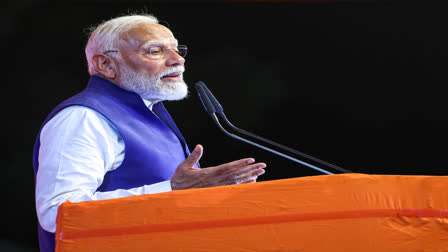The Bharatiya Janata Party did not win 400 seats, as it had promised, but they will still form the government in Delhi. Unlike what the country has witnessed in the last 10 years, the NDA government that will be formed after this fascinating electoral contest that concluded Tuesday, June 5 will be different in many ways.
Firstly, it will be a coalition government with the Bharatiya Janata Party (BJP), which is still short by some 42 seats to form a government on its own. Secondly, it will have to lean heavily on three avowedly secular allies like Nitish Kumar, Chandrababu Naidu and Jayant Choudhary to attain a majority and lastly, the coalition government would have to craft a common minimum programme (CMP) to run the ordinary business of governance.
How did BJP reach this situation of extreme desperation at a time when it was dreaming of not only winning 400 seats in this Parliament elections, but also being bizarrely in power till the 2047? Elections and democracy were meant to endorse their passage into future rather than a system to make them accountable for their actions. From this standpoint, the parliament elections of 2024 were a big setback for BJP. Congress led INDIA alliance gave them a run for their money resulting in setbacks in areas they had not bargained for.
The state of Uttar Pradesh is a case in point. Prime Minister Narendra Modi, who ran a very Presidential campaign, behaved as if no one was in contest except him. No other candidate from the party mattered. This extreme view was not shared by the voters who judged the candidates according to their performance in their constituencies. Many MPs were replaced by the BJP, but it did not yield any dividends. Some of these candidates were treated as outsiders and expectedly got a drubbing. UP was also important for BJP as it nestled the religious disputes that brought the party to power.
The Ram Temple was inaugurated on January 22, 2024 by Prime Minister Modi. The date of consecration of Ram Temple was chosen to help the BJP to return to power in the parliament elections. The presence of a Hindu monk as the Chief Minister of the state, Yogi Adityanath was meant to help their cause.
In the early part of the campaign the BJP tried to spin the success behind the construction of the temple as the success of this government, but it did not gain traction. The BJP was in search of another campaign issue, but it faltered every time it took any step. In fact, the PM used communal language in his attempts to deepen fears about the Muslims.
It was a strategy that had worked for them in the past. Last time during the assembly elections to Chhattisgarh and Madhya Pradesh, the BJP had allegedly used the Hamas attack on Israeli settlements last year to deepen majority anxieties. Though there was no basis, but the BJP benefited from it enormously.
This time, the BJP found to be wanting on all the counts. Worse, the Congress leaders, Rahul Gandhi and Priyanka Gandhi, wrong footed Modi on many occasions. Akhilesh Yadav of the Samajwadi Party displayed his ample youth to perplex the BJP leadership. Despite drawing comfort from fake exit polls for a day, the BJP recognised that the writing was on the wall. As predicted to this writer by a politician from the ruling party, "BJP would lose 40 odd seats". This was in early April and no one in his right mind would suggest that the ruling party could lose.
There was more evidence of BJP losing control of UP. In Varanasi, PM's constituency, this writer found bitterness all around. People who would seem to be supporters were spewing vitriol at the PM. It was apparent that the respect or fear of the PM had lifted. There were expectations that due to Modi's presence in Varanasi, BJP would win in 13 seats in eastern UP, but the region proved to be a graveyard of BJP's hopes.
Rahul Gandhi and Priyanka Gandhi ran a great campaign to win Rae Bareli and Amethi. The big casualty of their campaign was senior BJP leader Smriti Irani, who humiliatingly lost to Gandhi retainer, Kishori Lal Sharma. Rahul won from Rae Bareli by a huge margin. Modi in comparison, won from Varanasi, but by a reduced margin of a lakh odd votes.
BJP lost many seats in Rajasthan, but managed to prove the pollsters right in some of the states of India. Odisha and Andhra Pradesh for instance. If the BJP has managed to hang on to 240 seats then the reason is the party's decent performance in Odisha, where it can form state government and in Gujarat.
In Delhi, too, it has done well, and in the process completely decimated the Aam Aadmi party and its leadership of Arvind Kejriwal. It's possible that the AAP disappears from the political scene in the coming days.
Though the INDIA bloc is also trying to form the government, this is an operation to prevent their allies from crossing over. What we may witness in the coming days is an erosion of fake stability that this government had provided, and return of secularism backed by the government. It would be in order to expect revival of India's institutions like the judiciary and media that had been browbeaten and threatened to fall in line. India will indeed go through interesting times - as Chinese saying goes.
